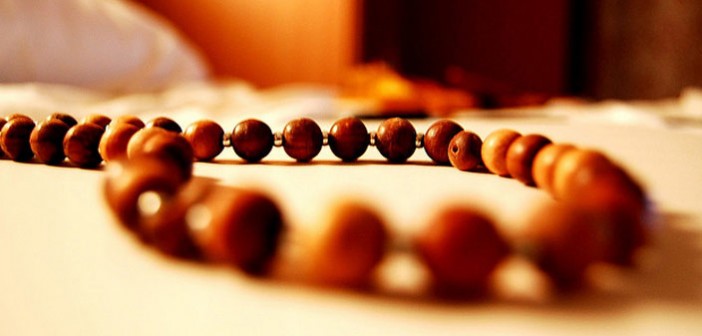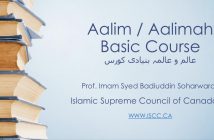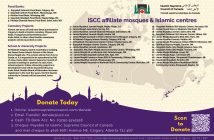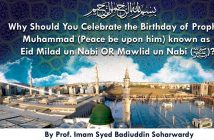The Quran Al-Karim, Ahadith and Scientific Findings on Dhikr, the Science of Prophet Muhammad (salalaho alayhi wasallam)
By: Sakina Gul Hussain
In this paper we will examine why Allah (swt) tells us that His Dhikr (remembrance) is incumbent on those who seek to be close to Him in order to experience His love and, in essence, help ourselves to become better Muslims. We will try to answer the questions of why should we remember Allah (swt)? When this has been established through the understanding that Allah (swt) actually commands His creation to make dhikr of Him, we will establish exactlywhat must we remember? The next question in ones’ mind may be so then how do we make remembrance of Allah (swt)? We will also examine what the benefits of dhikr are, giving full Quranic verses which provide clear evidence to support the importance of dhikr and finally, we will examine scientific findings from laboratory tests from the University of Washington concerning the effect dhikr has on the human brain.
Why must we remember?
First of all let us to turn to the Highest authority, the Holy Koran which gives us clear proofs as to why we must make remembrance (dhikr) of Allah (swt) …
‘If you remember Me, I will remember You’ (2:152)
‘Remember thy Lord much, and praise Him in the early hours of he night and morning’ (3:41)
‘After you have performed the act of worship (salaat), remember Allah (swt) standing, sitting and lying down.’ (4: 103)
‘Lo! Even I am Allah. There is no god except Me. So serve Me and establish worship for My remembrance.’ (20:14)
‘But verily, remembrance of Allah (swt) is more important’ (29: 45)
‘O ye who believe! Remember Allah (swt) with much remembrance’ (37:75).
In the Deen of Islam the greatest sin is in fact forgetfulness (al – ghaflah) and the purpose of the revelation of the message of Prophet Mohammad (saw) is to enable man to remember. That is why one of the names of the Quran itself is ‘Remembrance of Allah’ (Dhikr Allah) and why the ultimate end and purpose of all Islamic rites and all Islamic conjunctions is remembrance of Allah (swt). Islam is not based on original sin as understood in the later understanding of ‘Christianity’ but it does accept the fall of man (al-hubut) from the primordial and original state of perfection in which he was created. That primordial nature of man cannot confirm but to the Divine Unity. It cannot but bear witness to Al-Tawhid. Why? Because we are created with this inherent fitrah (inherent nature.) But precisely because of this fall, man’s will has become warped in the sense that it has become subservient to the passions rather than to Allah (swt.)
It is the pollution of lust, individualism, consumerism and all the lowly desires of the self that cloud the heart and the man away from their inherent nature. It has caused us to be in a state of forgetfulness, heedlessness and inevitably, spiritual loss. So how do we get back to a soul and mind at peace? How does remembrance help and for that matter what exactly must we remember?
What must we remember?
Allah (swt), the Most High, Himself shows the way for those who seek to remember Him. ‘Remember Allah (swt) as He has guided you’ (Sura Baqara: 198) This means to remember that your Creator has bought you to a certain level of consciousness, faith and that you can remember Him in accordance to this ability.
The Prophet (salallaho alayhi wasallam) says: ‘The best declaration of remembrance is the one which I and all the Prophets before me recite. It is the divine phrase’ La ilaha illa Llah’ which means “there is no god but Allah.”
The Prophet Moses (as) was told by Allah (swt) that dhikr is the most preferred of special prayers because of its ability to inculcate deep sincerity in the heart of the believer. ‘La illah illa Llahu’ is also termed the Purification of Souls. In short there is nothing greater than this remembrance of Him, exalted is He.
Over and above everything you do, the material being in you must follow the straight path, the ‘Siratul Mustaqeem.’ That is only possible through preserving and following the precepts of religion. To do this one has to be conscious to remember – to remember Allah (swt) night and day, inwardly and outwardly, continuously. For those who see the truth, to remember Allah (swt) is an obligation. As Allah (swt) orders:
‘Remember Allah standing (swt) and sitting and lying down.’ (Sura Nisa: 103)
‘…those who remember Allah (swt) standing and sitting and lying on their sides, and who reflect on the creation of the heavens and the earth. Our Lord, Thou hast not created this in vain! Glory be to thee …’ (Sura Al-Imran: 190)
So we have established now that Allah (swt) wants us to remember Him as much as we possibly can. After all He created us. He caused us to breathe. People worship money, some worship rock stars so why not worship and remember the One who caused us to breathe? This is a logical stand point although there is the great reason to have love to remember Allah (swt) for His sake and for His sake alone.
So then what is remembrance (dhikr)? How do I make dhikr of Allah (swt)?
Remembrance pronounced in words is but a declaration that the heart has not forgotten Allah (swt). The inward silent remembrance is a movement of the emotions. Dhikr is to remember, mention and meditate. It is known as persisting, dwelling on a subject to the point of its full comprehension and meditating on it. The remembrance of the heart is through feeling in oneself the manifestation of Allah’s (swt) might and beauty, whilst the remembrance of the soul is through the enlightenment of the divine light generated by Allahs (swt) might and beauty.
A condition for the effectiveness of remembrance is to pronounce aloud the words and phrases of what is to be remembered ~ the Confession of Unity, the attributes of Allah (swt). When these words are recited, one uses all efforts to be in a conscious state. In this way the heart hears the word and is enlightened with the light of what is remembered. It receives energy and becomes alive ~ not only alive in this world, but alive forever in the hereafter. Allah describes this eternal life: ‘They taste not therein death, except the first death.’ (Sura Dukhan: 56) They enter into a state of reality.
Prophet Muhammad (salallaho alayhi wasallam) describing the state of the believer, who achieves truth through remembrance, says: ‘Believers do not die. They only pass through this temporal life to the everlasting life.’ And they do there what they did here. As he says, ‘The prophets an the ones closest to Allah (swt) continue their worship in their graves as they did in their houses.’ The worship Rasool Allah (sal Allah alayhi wasallam) mentions is inward supplication of Allah (swt), not the obligatory five times a day in this world, with its standing, bowing and prostration but the inward silent supplication is one of the principal qualities of a true believer.
One must remember that wisdom is not obtained by man through his own accord but given to him by Allah (swt) alone. Book knowledge can only achieve so much. Allah (swt) brings one to His secrets only if ones heart is alive and conscious with the remembrance of Him, and if that conscious heart has the wish to be open to receive the truth. As Habib Allah (salallaho alayhi wasallam) says: ‘My eyes sleep, but my hear is ever awake.’ His heart was awake with dhikr of Allah (swt) and therefore open to receive the Truth.
The way to a free heart, to purify it, is to remember Allah (swt.) At the beginning, this remembrance can only be done outwardly, by repeating His Divine Names, pronouncing them aloud so that you as well as others can hear and remember. As the memory of Him becomes constant, remembrance sinks to the heart and becomes inward, silent.
Allah (swt) says:
‘Believers are those who, when Allah is mentioned, feel a tremor in their hearts, and when they {see and} hear His manifestations their faith is strengthened.’ (Sura Anfaal: 2)
Tremor means the awe, fear and love of Allah. With this remembrance and recitation of Allah’s (swt) Names, the heart wakes up from the sleep of heedlessness, is cleansed, and is shined. Remember this task of remembrance and dhikr is to take you out of that state of sleep, of spiritual loss and into a state of spiritual gain and peace, insha Allah. The Prophet (sallallaho alayhi wasallam) said: ‘The men of knowledge outwardly visit and inspect things with their minds, while the wise are inwardly busy cleaning and shining their hearts.’ Dhikr is a means to shine your heart.
Scientific proofs of the beauty and effect of dhikr, the Science of Prophet Mohammad (sallaho alayhi wasallam)
We have looked at the spiritual and Islamic understanding of the remembrance of Allah (swt.) For further proof – let us now examine scientific proof supporting the effect dhikr has on the human brain.
What is the brain itself? All the activity of the brain is nothing but bio-electrical activity in several distinct parts of it, amongst various sets of neurons (cellular groups) where each are assigned a specific duty, functioning as a whole. Each and everyday 14 million neurons that make up the brain, are in constant interaction with 16 billion neighbouring neurons. All our activities and our understanding, that is all the functioning of the brain is the result of countless bioelectrical flows, are brought to existence in these sets of neurons occurring as a result of these interactions.
Now, when dhikr is practised you continuously repeat a given name of Allah (swt) a specific number of times and therefore reflecting a meaning that belongs to Allah (swt) During the repetition of dhikr, certain regions of the brain are engaged and become active. There occurs a bioelectrical flow in those neural groups of the brain. After that task is performed repeatedly
(as you repeat on the same name or a group of names) the neural activity increases, and so does the bioelectrical energy. In turn, this overflows and new sets of neurons are put to work and so, some other regions of the brain become active. Therefore the brain begins to expand. The brain starts to bring out new meanings, perspectives and commentaries that it had not previously used before the practise of dhikr. It is opening to receive the Truth. So just think what the effect that dhikr has on the heart to receive Truth!
Clearly the whole brain is a centre of interpretation. Clearly there exists no picture, no sound inside the brain. To achieve a state of consciousness (i.e. heedful to Allah’s (swt) commands) we must use our brains to enter reality and the more we become conscious, the more benefits we will attain, insha’Allah.
So what do Western scientists think of these findings? The findings of complementary laboratory tests may be found in the ‘Scientific American’, December 1993:
‘Complementary findings were described this year by investigators at Washington University and which have emerged through PET scans of humans. PET measures neural activity indirectly. In the experiments, volunteers were provided wish a list of nouns. They were required to read the nouns. One by one and to propose for each noun, a related verb. When the subjects first did this task, several distinct parts of the brain, including parts of the prefrontal and cinulate cortex, displayed increased neural activity. But if the volunteers repeated the task with the same list of words several times, the brain activity shifted to different regions. When a fresh list of nouns was given to them, the neural activity increased and shifted back to the first regions again.
PET Scans completed at Washington University show certain regions of the brain engaged as a subject reads a list of nouns and suggests related verbs. Different regions become active after the first task is performed repeatedly with the same list. The original areas of the brain re-engage when the subject is given.
Thus we see even Western science is waking up to the benefits of dhikr which was understood by Muslims many centuries ago without ‘hi-tech’ research to provide proof.
What are the benefits of dhikr?
Again we turn to the Holy Koran to provide us with answers as to the benefits we will receive from making remembrance of our Creator:
‘And men who remember Allah much and women who remember Allah much, Allah hath prepared for them forgiveness and a vast reward.’ (33: 35)
‘Verily in the remembrance of Allah (dhikr Allah) do hearts find rest!’ (13:28)
‘If you remember Me, I will remember You’ (2:152)
‘They only the true believers whose hearts feel fear (wajilat ~ tremble or shake) when God is mentioned (dhikr Allah)’ (8:2)
Closely examine the latter parts of the first three verses quoted above and notice the benefits they describe. ‘Allah (swt) hath provided for them forgiveness and a cast reward’ (33:35), ‘ … hearts find rest!’ (13:28) and ‘ ..I (Allah, swt) will remember you’ (2:152).
‘Say, I seek refuge with (Allah) the Lord of mankind. The King of mankind. The Ilaah (God) of mankind. From the evil of the whisperer (devil who whispers evil in the hearts of men) who withdraws (from his whispering in ones hearts after one remembers Allah, swt)
Who whispers in the breasts of men. Of jinn’s and men. (30:114)
So, in sum not only will the one who remembers receive an abundant reward in the afterlife but also protection from the attack of the devil. Examine the above closing verse of the Holy Koran and you can read the advice Allah (swt) is giving here. When you remember Allah (swt) you will be protecting yourself from the whispers of the one who causes a lot of strife, doubt, uncertainty and the keys to spiritual loss. To help yourself to rid yourself of the one ‘Who whispers in the breasts of men,’ (30:114) one has to replace those whisperings with remembrance of the Highest kind, that of dhikr of Allah (swt) to truly find peace.
Whilst we have attempted to give an insight into dhikr we understand that the benefits of dhikr cannot truly be given justice through words alone. It is only through the practice of the methods of dhikr that one may hold a key to spiritual success and experience a heart at peace with itself.
The question, which we must now ask ourselves, is whether we are fully using the capacity of our brains and hearts. Whether our lives are lived with a specific purpose, goal and with direction. The Muslim at peace is the one who understands that this life is but a game and a means to deceive. There is much to be lost without a goal and focus in life. When a religion cannot provide the answers one seeks, it throws the whole basis of that religion into doubt. When we delve into a religion deeply we look into our intentions of why we are following it and whether it truly makes sense. One needs to ask: does my heart and mind agree with what I am doing? Does it make sense to me? The system of life of remembrance, as of the Deen Of Allah (swt) provides those answers, the means, the methods and the benefits, as we have outlined above. The middle path of Allah (swt) makes perfect sense, where there is no doubt and where most importantly both the heart and mind agree. One needs to ask whether they want to remain asleep, in a state of confusion, spiritual loss and where the heart and mind are in conflict. Or, whether they want to help themselves to a vastly focused life with the goal to please Allah (swt) alone and where the heart is in a state of greater tranquillity and hope.






